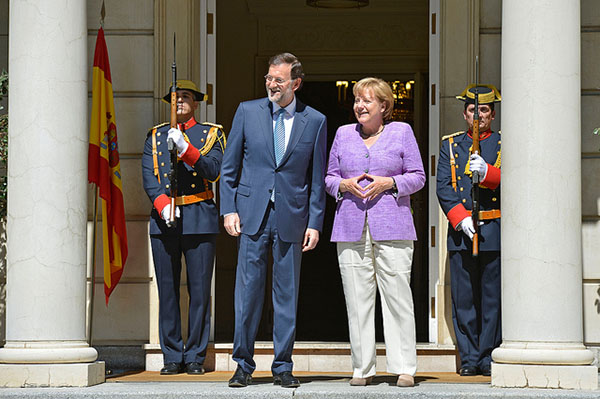
The EU is facing enormous economic, social and geostrategic challenges. Internally, it needs to cope with increased inequality (due to the effects of the Great Recession and the Eurozone crisis, but also the impact of new technologies and automation), the flaws in the governance of the Eurozone, Brexit, the refugee and migration crisis and the emergence of illiberal regimes in Hungary and Poland. Externally, it must deal with a more inward-looking and protectionist US, with a more assertive China and a more aggressive Russia and with perpetual instability in the North of Africa and the Middle East. While Germany is the strongest member state in the EU, it needs partners to handle all these menaces. Traditionally, it has always looked to France, but this is not enough –even with the newly elected President Emmanuel Macron–. Given the complexity of the challenges, Germany needs more allies around the table.
In principle, Spain is well suited to play this supportive role. It is the fourth largest economy in the Eurozone –and, with Brexit, it will become the fourth for the EU as a whole–, a middle power in the security realm, an active player in all multilateral organisations and a permanent invitee at the G20 meetings and, after undertaking a number of painful structural reforms, is now experiencing its third year of GDP growth of over 3%. In general, there is a sense that Spain is politically more stable and economically more dynamic than Italy. This explains why recently Mariano Rajoy joined Angela Merkel, François Hollande and Paolo Gentiloni at the latest Big Eurozone Four (BE4) meeting at the Versailles Palace. This has empowered Spain’s Foreign Minister, Alfonso Dastis, to say that after years of introversion ‘Spain is back’ on the European and international stages. The efforts of the Minister of the Economy, Luis de Guindos, to become either the next President of the Eurogroup or the Vice-president of the ECB are a clear example of this new self-confidence.
However, does Germany see Spain as a reliable and effective partner? Not quite yet. When issues arise and alliances in the EU are needed, the tendency in Berlin is, of course, first to call Paris, then Warsaw, because of the geostrategic importance of ‘The East’, then the likeminded prosperous neighbours in the north or centre –The Netherlands, Finland and Austria, perhaps even some of the Nordic countries–, afterwards Italy and finally, if no-one picks the phone up in Rome, which can happen now and again, then there is a call to Madrid. Thus, Spain is relatively low in Berlin’s pecking order. There the feeling is that France always needs a Mediterranean ally to counterbalance increased German prowess and since Italy has major internal problems right now, perhaps Spain can become ‘the other Italy’. This might not be very flattering for Madrid (nor for Italy for that matter), but it is the harsh reality.
Nonetheless, Spain should take this opportunity to prove why it ought to be higher in Berlin’s go-to phone list. It is time for Spain to move from EU policy-taker (the traditional attitude) to policy-shaper, with the long-term strategy to become a policy-maker. This can be done in a number of areas. Brexit should be the first. Both Germany and Spain are more exposed to the British economy than France. This means that both need to play a clever game of maintaining the red line of not allowing any cherry-picking in the four freedoms, but also securing that the future relationship with the UK remains amicable and successful. When it comes to deepening EMU, Germany and Spain can also cooperate further. Unlike France, where over 40% of the electorate voted for political options that are either against or sceptical of the EU, the Spanish and German populations at large are still widely pro-European. This gives Berlin and Madrid the opportunity to design a new convergence plan that can lead to the next stage of European integration: the fiscal union.
Germany and Spain should also work together in strengthening cooperation in the field of internal and external security. Spain in this regard has a lot of experience to offer. The decades-long fight against the terrorist group ETA and the upgrading of capacities and know-how after the 11 March 2004 Madrid Islamist attacks give it sufficient credibility to shape the new policies adopted in Brussels against Islamist terrorism. The same can also be said of Spain’s migration policy. Madrid has decades of experience in trying to reduce the inflow of economic migrants from Africa by cooperating closely with the countries of origin, a method that is now closely studied both in Brussels and Berlin. Spain should also consider moving closer to Germany in helping the younger generations of the EU get jobs. This is an area where Germany is ready to help and invest. But here again Spain needs to put forward specific plans to improve its education, dual vocational and active labour market policies.
Finally, an area on which Spain should focus its efforts is the creation of a proper energy union. The interconnections between Spain and France are still underdeveloped and it would be in Germany’s own interest to import more energy from Spain. Of course, this needs to be in cooperation of France. But ultimately, this is another reason why the BE4 is so important. Not because Germany, France, Italy and Spain can impose their will, but rather because they can come to agreements on concrete areas that can have positive spill-over effects for the rest of the EU. In this way, the BE4 would not be the EU’s core group, but rather a key group focused on core efforts.


